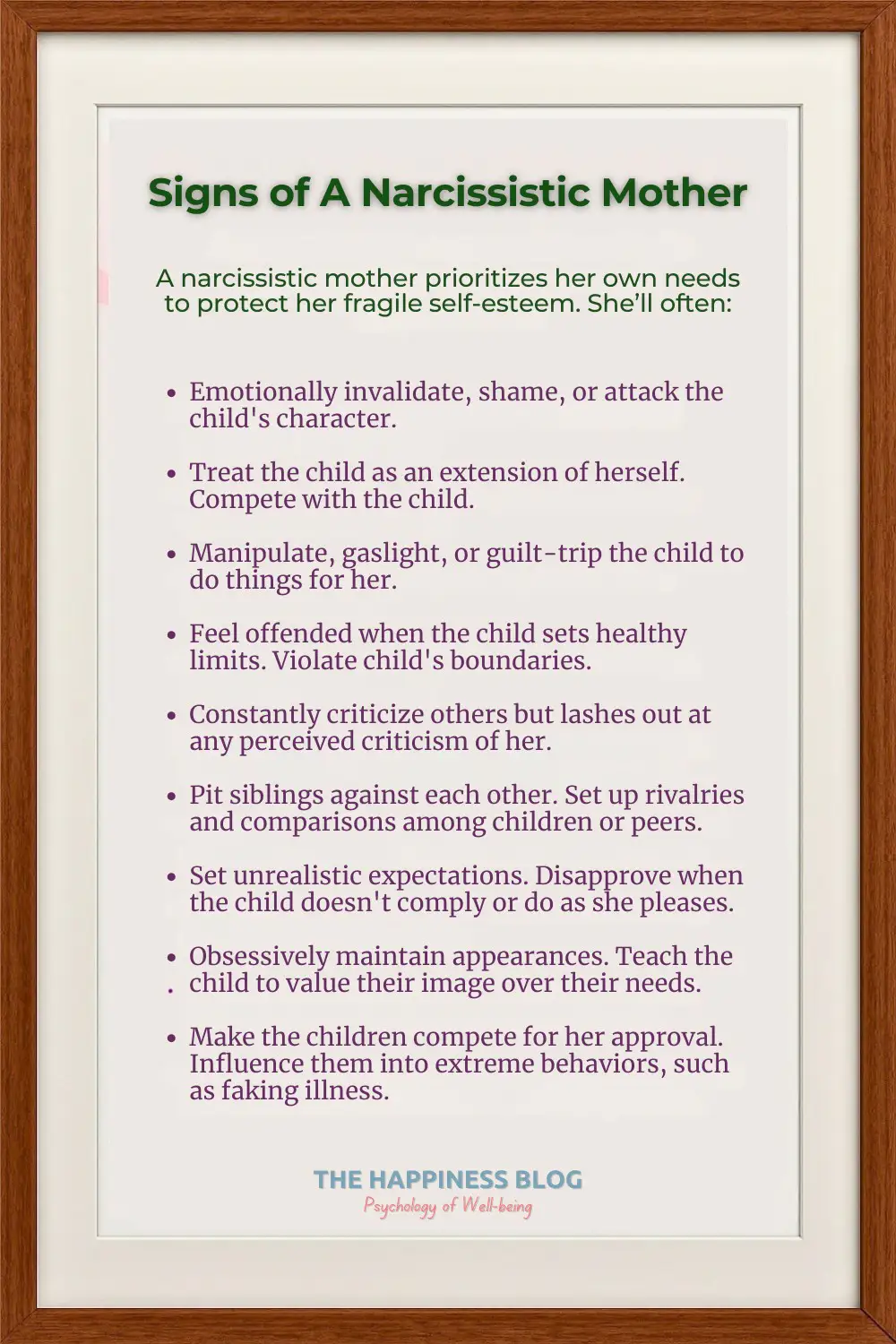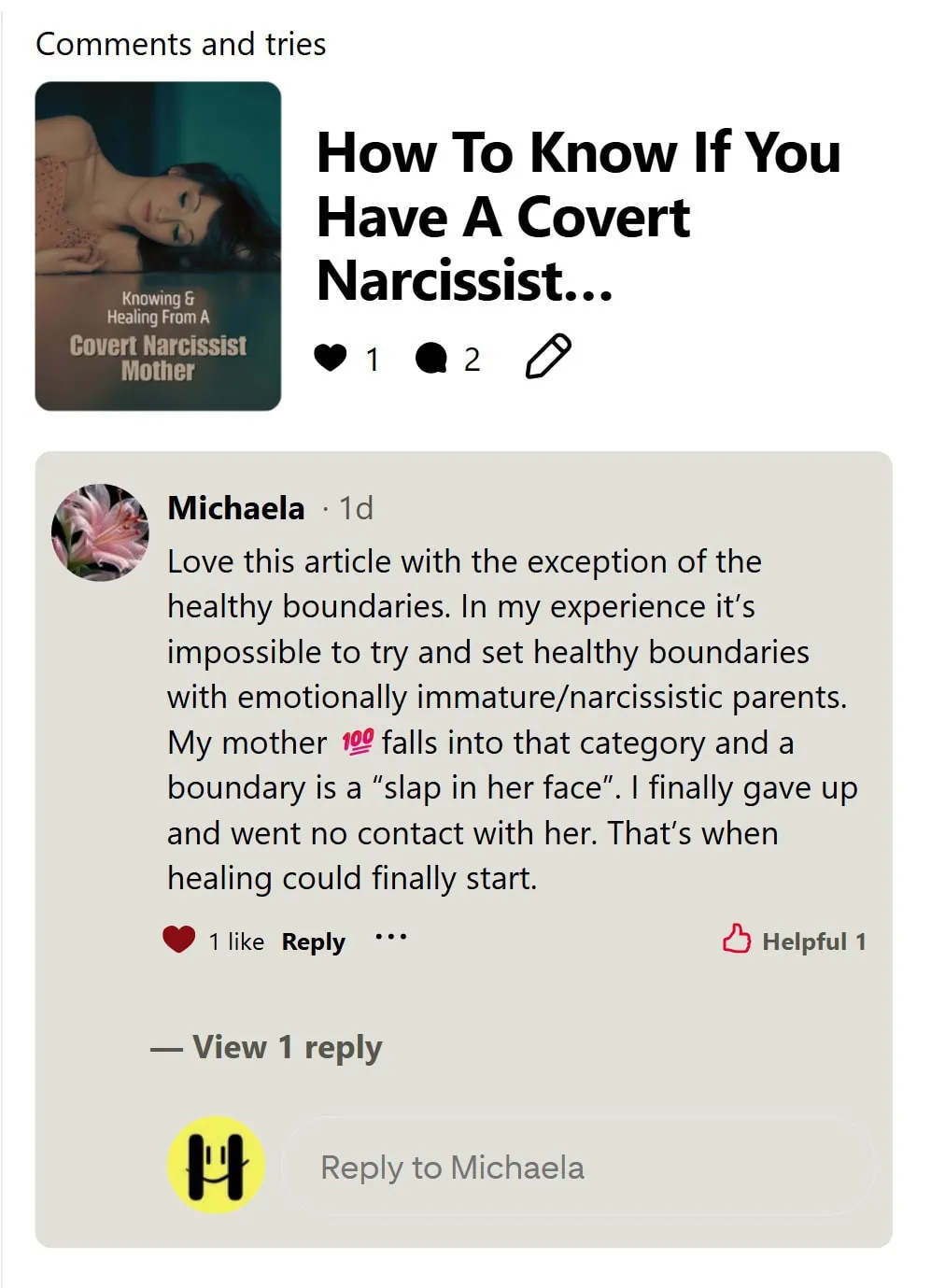Today's Saturday • 8 mins read
— By Dr. Sandip Roy.
Growing up with a covert narcissist mother is a scarring experience. Emotionally, she might have put at least one of her kids through one of the toughest childhoods.
This study found that adult children of narcissists judged their childhood experiences as:
- “It’s a brutal way to be raised.”
- “A way forward: it was them, not me.”
- “I see the tentacles of how deep and far and wide it goes.”
If you have or had a covert narcissist mother, then read through to understand how they function, what their nature is, and how they afflict their children.
Signs of A Covert Narcissist Mother
The four main traits of a covert narcissist mother are:
1. They will mark out “The Golden Child.”
Covert narcissist mothers target one high-empathy child as their main supply. This child loves, admires, respects, and pays full attention to her. This is known as “golden child syndrome.”
This golden child experiences something like “emotional familial boundary violation.” Their childhood is spent meeting their mother’s emotional needs and demands, neglecting their own.
In return, this “golden child” gets conditional love. Their mother often reminds them, “If you don’t do this, I won’t love you…”
They constantly try to be perfect and meet their mother’s needs and expectations so that she will like them. Otherwise, they would lose her love and even be criticized and shamed.
This is classic covert manipulation, using occasional praise, love-bombing, and withholding to mold the child into an emotional crutch for the mother’s needs.
The child gradually learns that their happiness depends on how pleased their mother is with them.
Later, this transforms into a general people-pleasing tendency. And can lead to anxiety, trust issues, and codependency in relationships outside the family.

2. They will play the “Self-Sacrificing Saint.”
These mothers often present themselves as victims or martyrs.
They are loud with their claims of making sacrifices for their children. This behavior is designed to make the kids feel indebted to her.
For instance, instead of taking her child to a doctor, she might give her daughter diet pills, saying she used her savings to buy this “gift” to make her more presentable and desirable.
This disguising of self-centered acts as help, sacrifice, or gifts erodes the child’s social confidence.
They grow up confused about accepting help from anyone, feeling it would make them indebted.
3. They compete with and belittle their child.
A covert narcissistic mother often competes with her children while minimizing their needs.
Minimizing involves downplaying or negating the child’s feelings, achievements, or experiences, making the child feel unimportant.
She might also try to outdo her kids, making them feel like they can never be good enough compared to her.
When things go wrong in the family or the household, she finds a way to blame her children.
She refuses to take responsibility, even when the issue is of her own doing. This pushes the child to feel constantly guilty and at fault for anything that goes wrong.
4. They will isolate and sow self-doubt in the child.
She often creates false narratives about others being treacherous while self-aggrandizing her qualities.
Her chronic lying, gaslighting, and manipulativeness make it difficult for the child to trust anyone but her.
This creates an isolating later life for her children. Over time, the child starts to feel secure only in their own space.
This false sense of “safety in isolation” leads them to doubt their own perceptions and memories (“self-gaslighting”).
The child grows up lonely and unsure of themself, never feeling safe to share their vulnerabilities with others.

How To Heal From A Covert Narcissist Mother
A covert narcissist mother inflicts emotional wounds that are difficult to heal. Try these initial steps:
1. Accept and Validate Your Lived Experience
First, accept the truth about the person who raised you and how she affected you. Stop denying that your mother has harmed you; she has, even if she did not realize it.
Denial is a defense mechanism that keeps you from feeling bad, but it also stops you from getting better.
The negative voice in your head is your mother’s, not yours. The emotional pain, confusion, or difficulties you carry are not your fault.
Because covert narcissism is often subtle, insidious, and gaslighting, your experiences may have been dismissed, minimized, or distorted by your mother. Later, you learned to do the same to yourself as a survival tactic.
You had a childhood you didn’t deserve.
Once you realize this, grant yourself full permission to feel every emotion that follows. Feel the anger, sadness, confusion, betrayal, regret, or deep grief.
Processing your difficult feelings is essential for your healing.
2. Cultivate Self-Compassion To Break Self-Neglect Cycles
What should you do once you’ve accepted that you were not to blame for the damaging effects of your mother’s behavior on you? Become your own best friend!
Self-compassion is treating yourself with the same kindness and empathy that you’d treat your best friend.
Your younger self chose various survival mechanisms to cope with a challenging and often invalidating emotional environment, such as:
- self-silencing,
- mother-pleasing,
- chronic self-doubt,
- being overly responsible for your mother’s feelings.
Give yourself the gift of empathy, patience, and kindness. Not the judgment or criticism. This compassion can break these ingrained, often intergenerational, cycles.
- Start by courageously naming your own needs, feelings, and opinions.
- Begin practicing small but consistent acts of self-care, self-prioritization, and assertive communication.
- Learn to set healthy boundaries, to say ‘no’ to demands that drain you, and protect your emotional and mental well-being, even if it feels uncomfortable or guilt-inducing.
Self-compassion is a powerful antidote to the harsh inner critic and pervasive shame often instilled by a narcissistic parent, and it is a cornerstone of lasting healing.

3. Label and Challenge Your Negative Beliefs
A covertly narcissistic upbringing can leave you with many negative core beliefs about yourself, others, and the world.
Your inner critic, often a “ghost” of your mother, may tell you wrong things like:
- “I’m not good enough.”
- “I’m inherently flawed.”
- “I’m responsible for others’ happiness.”
- “Love is conditional and must be earned.”
- “My needs are unimportant and a burden.”
Become aware of these unconscious beliefs. Journaling can help you find these old, painful messages and figure out where they came from.
Once you know what they are, start to question their truth. Ask yourself:
- How helpful is it to live your present life through the skewed lens of your past?
- What’s the evidence for and against the negative beliefs in your current life?
- Which positive realities reflect your life more accurately right now?
Replace your harsh, internal critic with some positive affirmations:
- “I’m doing my best and becoming better every day.”
- “I am enough and don’t need others to validate my worth.”
- “Taking care of myself is important, and loving myself is not being selfish.”
4. Reclaim/Rebuild Your Authentic Identity
Set your sights on becoming the best and most complete version of yourself.
Children of narcissistic mothers often struggle with a diffuse or poorly formed sense of self. This is because they were:
- frequently treated as an extension of the parent,
- valued more for how they met the mother’s needs or reflected on her,
- not being seen, validated, or nurtured as a separate, unique individual with their own intrinsic worth, thoughts, feelings, and desires.
A key part of healing involves the heroic work of reclaiming and rebuilding your authentic identity. This journey of self-discovery reveals:
- Who are you, truly, separate from your mother’s expectations, projections, and definitions?
- What truly brings you a sense of aliveness, meaning, and fulfillment in life?
Uncovering your true self may feel disorienting or even selfish at times, but persist.
- Start by exploring your interests, curiosities, passions, innate talents, core values, and deeply held life goals.
- Join a group of other survivors who can provide you with support and a fresh perspective on life. They can help you rediscover your voice in a safe and secure environment.
- Therapy can also be helpful, especially with a specialist who has dealt with complex trauma and narcissistic abuse.
5. Learn To Set Healthy Boundaries
Adult children of covert narcissists often grow up thinking it’s okay to allow anyone to intrude on their personal space or time. Or let anyone use their things without asking first.
If you have the same mindset, please learn to set your boundaries. Your boundaries tell other people what is yours and how much of their behavior you will put up with.
It’s okay to: Stop people from intruding on your sacred me-time. Be honest about what you need and want. Say “No” to people and their offers.
The way to conquer fear is to do it despite trepidation and palpitation.
That said, healthy boundaries may not be an option for many daughters, as aptly pointed out by Michaela (below):

Final Words
Growing up with a covert narcissist mom means going through daily abuse and trauma. The scars are raw for a long time, sometimes well into later life
You can heal from it. But remember that it will be a taxing, complex process. Some people may take decades to heal completely.
- Be patient and kind to yourself.
- Celebrate and reward yourself for the good days and positive changes in yourself.
- Even as you are on your journey to becoming trauma-free, let yourself be happy from time to time.
√ Also Read: Troubling Symptoms of Daughters of Narcissistic Mothers
√ Please share this with someone.
» You deserve happiness! Choosing therapy could be your best decision.
...
• Disclosure: Buying via our links earns us a small commission.
